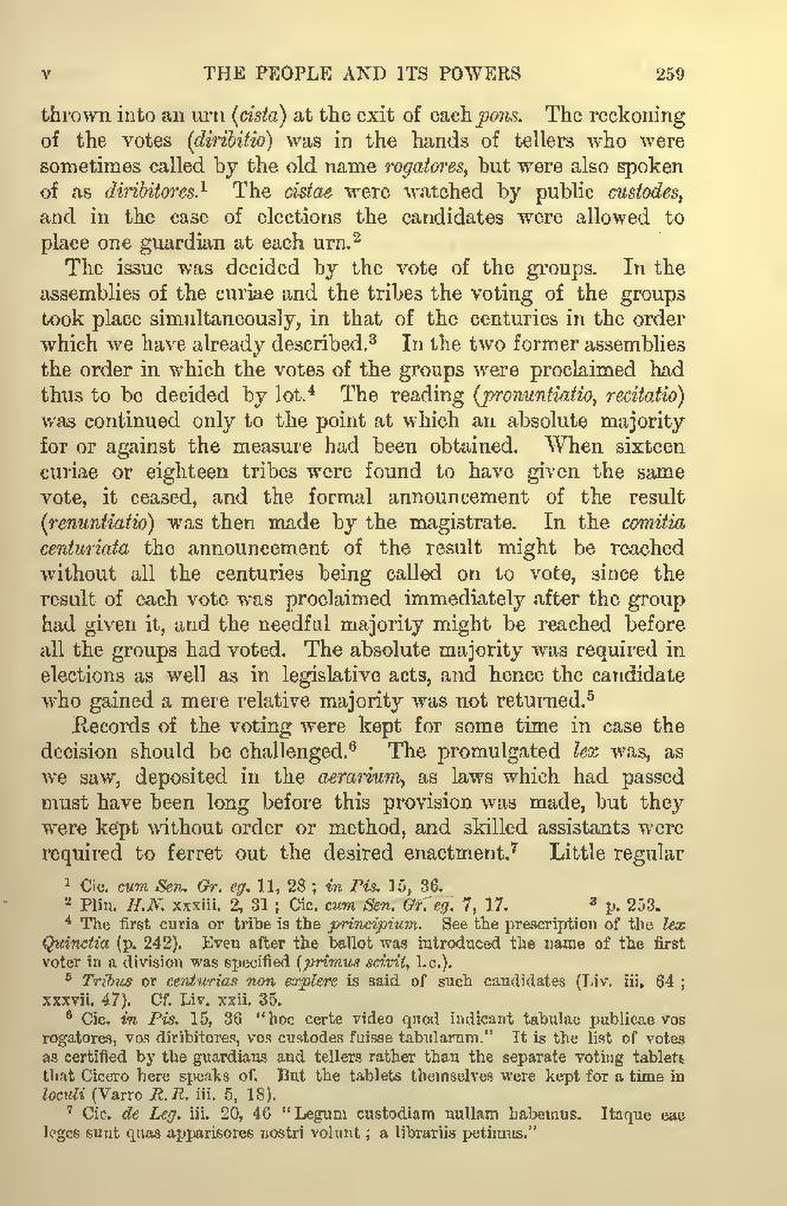thrown into an urn (cista) at the exit of each pons. The reckoning of the votes (diribitio) was in the hands of tellers who were sometimes called by the old name rogatores, but were also spoken of as diribitores.[1] The cistae were watched by public custodes, and in the case of elections the candidates were allowed to place one guardian at each urn.[2]
The issue was decided by the vote of the groups. In the assemblies of the curiae and the tribes the voting of the groups took place simultaneously, in that of the centuries in the order which we have already described.[3] In the two former assemblies the order in which the votes of the groups were proclaimed had thus to be decided by lot.[4] The reading (pronuntatio, recitatio) was continued only to the point at which an absolute majority for or against the measure had been obtained. When sixteen curiae or eighteen tribes were found to have given the same vote, it ceased, and the formal announcement of the result (renuntiatio) was then made by the magistrate. In the comitia centuriata the announcement of the result might be reached without all the centuries being called on to vote, since the result of each vote was proclaimed immediately after the group had given it, and the needful majority might be reached before all the groups had voted. The absolute majority was required in elections as well as in legislative acts, and hence the candidate who gained a mere relative majority was not returned.[5]
Records of the voting were kept for some time in case the decision should be challenged.[6] The promulgated lex was, as we saw, deposited in the aerarium, as laws which had passed must have been long before this provision was made, but they were kept without order or method, and skilled assistants were required to ferret out the desired enactment.[7] Little regular
- ↑ Cic. cum Sen. Gr. eg. 11, 28; in Pis. 15, 36.
- ↑ Plin. H.N. xxxiii. 2, 31; Cic. cum Sen. Gr. eg. 7, 17.
- ↑ p. 253.
- ↑ The first curia or tribe is the principium. See the prescription of the lex Quinctia (p. 242). Even after the ballot was introduced the name of the first voter in a division was specified (primus scivit, l.c.).
- ↑ Tribus or centurias non explere is said of such candidates (Liv. iii. 64; xxxvii. 47). Cf. Liv. xxii. 35.
- ↑ Cic. in Pis. 15, 36 "hoc certe video quod indicant tabulae publicae vos rogatores, vos diribitores, vos custodes fuisse tabularum." It is the list of votes as certified by the guardians and tellers rather than the separate voting tablets that Cicero here speaks of. But the tablets themselves were kept for a time in loculi (Varro R.R. iii. 5, 18).
- ↑ Cic. de Leg. iii. 20, 46 "Legum custodiam nullam habemus. Itaque eae leges sunt quas apparisores nostri volunt; a librariis petimus."
